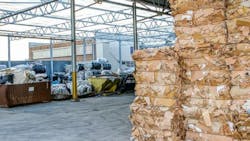General Motors (IW 500/3) announced last that it now operates 152 global facilities that recycle, reuse or convert to energy all waste from daily operations.
“We are committed to manufacturing cars and trucks for our customers in a safe and responsible way,” said Alicia Boler Davis, GM, Global Manufacturing.
“While we continue to increase the reuse of byproducts, our vision is to eliminate waste by applying the most advanced manufacturing processes and technologies in our plants globally,” Bloer added. One hundred of the facilities are manufacturing operations.
The range of efforts include recycling water bottle at the Flint plant into engine cover insulation tor turning Mississippi River tires into air-deflecting baffles.
The company is also working with its suppliers to advance a more circular economy where materials are kept in use. GM champions matchmaking efforts, such as the Materials Marketplace, where one company’s trash can be another’s raw material. GM mentors about 25 companies a year, from small businesses to large multinational corporations, on how to manage challenging waste streams. The company outlines best practices in a landfill-free blueprint..
Altogether, GM recycles or reuses 2 million metric tons of byproducts a year. Viewed another way if that material was placed into the beds of Chevrolet Silverado extended-cab pickup trucks and park them end to end, they would stretch around the world.
GM has generated up to $1 billion from recycling in recent years. The company reinvests that money into the business, including the development of fuel-efficient vehicles and new technologies shaping the future of personal mobility. Landfill-free facilities result in greater operational efficiency and eliminate waste-hauling fees. Repurposing waste into vehicle components or plant supplies means the company doesn’t have to buy virgin material.
“We view sustainability as a business approach,” said John Bradburn, GM global manager of Waste Reduction. “We look at ways we can grow and strengthen our business for the long term, and that often means reducing our environmental footprint while maximizing social benefit.”
About a third of GM’s total landfill-free sites are technical centers, warehouses and offices. While in the midst of a major renovation at three Michigan facilities, GM partnered with Herman Miller and Green Standards to repurpose surplus office assets into $1 million of in-kind donations to about 100 Michigan-based community organizations.
Landfill-free sites added this year are in Asia, Africa, North America and South America:
- Engine, parts distribution center and stamping operation in Talegaon, India
- Powertrain plant in Romulus, warehouse in Flint, aftersales operation in Madison Heights, storage facility in Grand Blanc, Mich.
- Distribution center in Charlotte, N.C.
- Parts distribution center and assembly plant in Quito, Ecuador
- Assembly plant in Cairo, Egypt
- Two assembly plants and two distribution centers in Port Elizabeth, South Africa
- GM Canada headquarters in Oshawa, Canada
- Foundry in Toluca, Mexico
- An assembly plant, stamping plant, technical center, engineering facility and support office in São Caetano do Sul, Brazil
- Assembly plant in Bogota, Colombia
With the Toluca, Mexico foundry now on the list — a site that melts and molds metal to make auto components — none of GM’s manufacturing operations in Mexico send waste to landfills. All GM European Opel/Vauxhall manufacturing plants have been landfill-free since 2015.
About the Author
IW Staff
Find contact information for the IndustryWeek staff: Contact IndustryWeek
